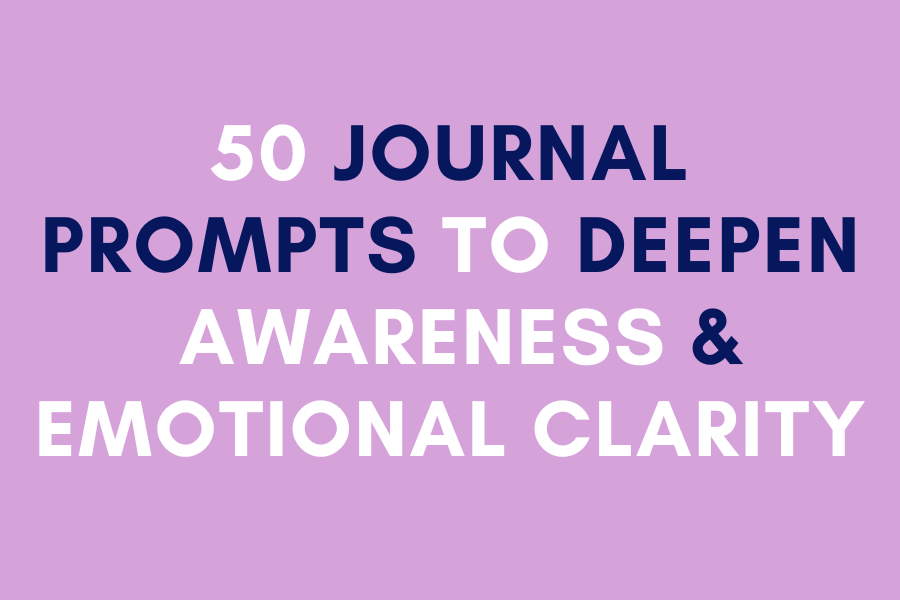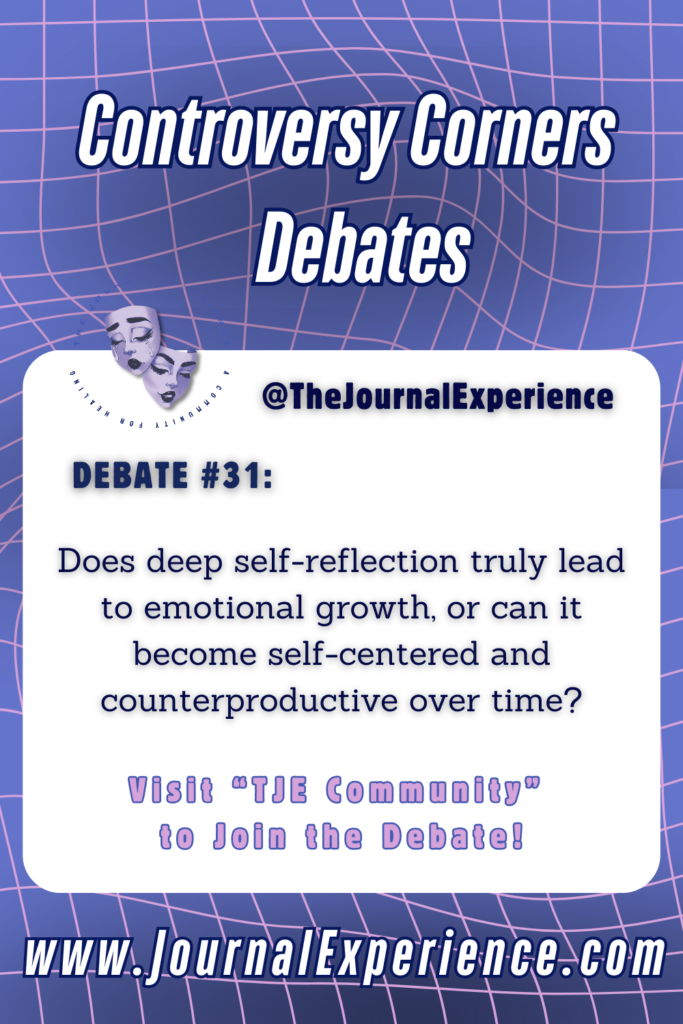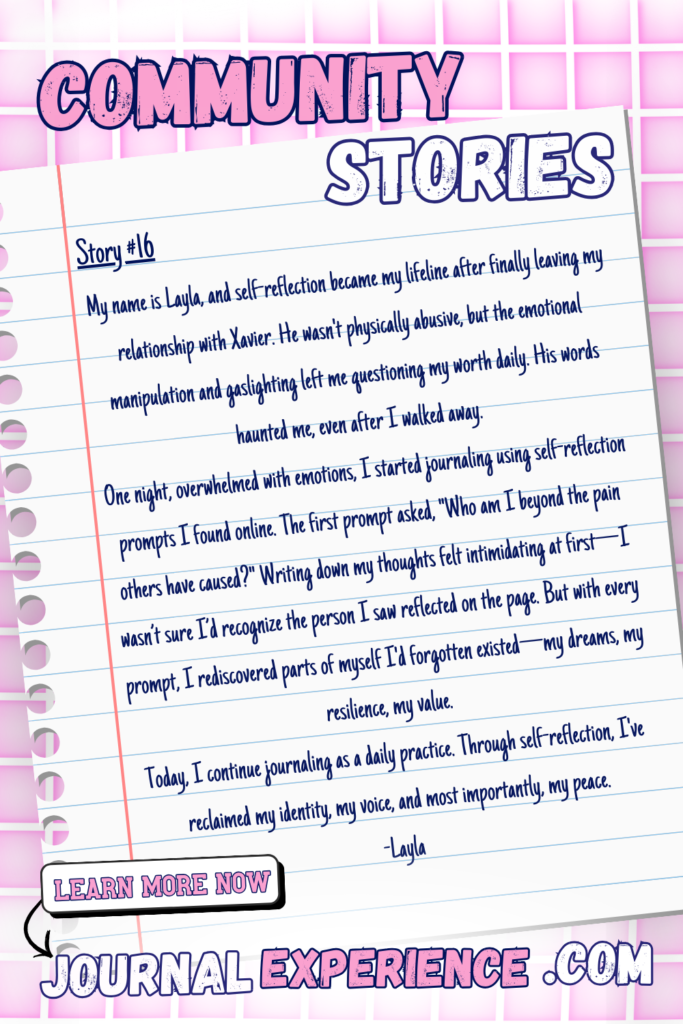Self-reflection is the practice of turning inward to examine your thoughts, emotions, behaviors, and experiences. It’s more than thinking deeply—it’s the act of observing yourself with curiosity and compassion. In a world that constantly pushes us to perform, react, and achieve, self-reflection is a grounding practice that helps you pause, breathe, and get honest about what’s truly going on inside.

This kind of internal dialogue is essential for emotional and mental well-being. When we take the time to reflect, we begin to understand the “why” behind our actions, recognize patterns that no longer serve us, and create space for intentional growth. And one of the most effective ways to begin or deepen this practice is through journaling.
Journal prompts act as gentle guides. They invite you to go deeper, ask better questions, and write from a place of emotional truth. Whether you’re new to journaling or looking to elevate your current practice, these 50 self-reflection prompts are here to support your journey.
This blog post is for anyone committed to self-awareness—whether you’re healing from toxic dynamics, navigating a new life chapter, or simply longing to feel more connected to yourself.
Curated Journal Prompts for Self-Reflection
Morning Reflection Prompts
Start your day with intention by checking in with yourself. These prompts are designed to set the tone for awareness, clarity, and mindful action.
- What am I feeling as I begin this day?
- What is one intention I want to carry with me today?
- How can I be kinder to myself this morning?
- What do I need more of today—and how can I give it to myself?
- What did I dream about last night, and how did it make me feel?
- How can I practice gratitude in small ways throughout my day?
- What limiting thought can I choose to release this morning?
- How do I want to show up for myself and others today?
- What kind of energy do I want to embody?
- What small act of courage can I take today?
Evening Reflection Prompts
Evening prompts allow you to decompress and make meaning out of your day. Use these to wind down and find closure.
- What emotion did I feel the most today, and why?
- What moment made me feel the most connected to myself?
- Did I honor my boundaries today? Why or why not?
- What challenged me today, and how did I respond?
- What thoughts or interactions do I need to release before sleeping?
- What am I proud of myself for today?
- What would I do differently if I could redo this day?
- How did I speak to myself in my mind today?
- What did I learn about myself today?
- How can I support myself better tomorrow?

Questions to Unpack Daily Emotions and Thoughts
These prompts help you get beneath the surface. They are perfect for any time of day when you feel emotionally stuck, overwhelmed, or introspective.
- What emotion am I avoiding, and why?
- What is something I’ve been afraid to admit to myself?
- Where do I feel tension in my body, and what might it be trying to tell me?
- What do I need to forgive myself for?
- What is one repetitive thought I’ve had lately?
- What story am I telling myself that may not be true?
- What am I craving emotionally right now?
- When was the last time I felt deeply at peace?
- What am I resisting, and what might happen if I let go?
- What helps me feel emotionally grounded when I’m overwhelmed?
Extra Self-Reflection Prompts for Depth and Clarity
Let’s complete this list with additional prompts that invite you into deeper awareness and personal truth.
- What do I believe about myself today that I didn’t believe a year ago?
- What relationship in my life needs more attention or boundaries?
- What part of me have I outgrown, and what part am I still getting to know?
- How have I changed through recent challenges?
- What does emotional safety mean to me, and do I have it?
- What limiting beliefs did I inherit, and which ones am I ready to let go of?
- What advice would I give to my past self about who I am becoming?
- What patterns keep repeating in my life, and what are they trying to teach me?
- How do I feel when I truly listen to myself?
- What parts of my identity have I been hiding, and why?
- What does inner peace look like in my daily life?
- What kind of love do I want to give to myself moving forward?
- What do I want to stop apologizing for?
- What makes me feel most like “me”?
- What dreams or desires have I silenced—and how can I give them a voice?
- What boundaries support my emotional clarity?
- How do I want to feel when I reflect on this season of life a year from now?
- What qualities do I admire in others that I also hold within myself?
- What does healing mean to me at this stage in my life?
- What truth do I need to write, even if no one else reads it?
The Benefits of Using Journal Prompts
Journaling with prompts goes beyond simply writing your thoughts down. It structures your reflection and deepens the quality of your insights. Here’s how:
Encourages Clarity and Emotional Release
Writing down your thoughts helps you gain clarity. What feels overwhelming in your mind often feels more manageable when written out. As you journal, emotions that were buried rise to the surface, giving you a safe outlet to express and process them. This emotional release can reduce anxiety, lower stress levels, and create a greater sense of emotional regulation.
Helps Recognize Patterns and Triggers
The more you journal, the more you’ll begin to see emotional and behavioral patterns emerge. Prompts can highlight recurring thoughts, beliefs, or reactions—giving you the power to interrupt cycles that no longer serve you. Over time, journaling builds awareness around your triggers, your emotional highs and lows, and the root causes of your reactions.

Supports Intentional Living and Personal Alignment
Self-reflection through journaling leads to intentional living. It encourages you to pause and assess whether your actions align with your values. Journaling helps you make more mindful choices, advocate for your needs, and create boundaries that reflect your worth. With each entry, you become more grounded in who you are—and less likely to abandon yourself for acceptance or approval.
Boosts Self-Compassion and Internal Trust
Using journal prompts can also help you soften your inner critic. Rather than spiraling into self-judgment, prompts offer a focused way to meet yourself with curiosity. This builds inner trust and rewires your emotional habits—making it easier to believe in your own wisdom and resilience.
How to Use These Journal Prompts Effectively
Prompts are a guide—but the magic lies in how you show up to use them. Here are a few ways to get the most out of your journaling experience:
Create a Safe, Quiet Journaling Space
Whether it’s a cozy corner, your bed, or a favorite park bench, designate a space that feels peaceful. Turn off distractions. Light a candle or play gentle music if that helps you feel centered.
Write Consistently, Even When It’s Hard
You don’t have to write daily, but consistency matters. The more you write, the more you’ll learn about yourself. Even if what comes out feels messy or repetitive—trust the process.
Don’t Judge Your Responses—Observe with Compassion
This is your space. There is no right or wrong way to respond to a prompt. Let your journal hold your truth without editing, fixing, or minimizing what you feel. Your words are enough, just as they are.
Creative Ideas to Deepen Your Practice
If you want to go beyond writing paragraphs, here are creative ways to expand your reflection process:
Art Journaling for Self-Reflection
Try combining words with art. Draw your emotions, create a mood collage, or let your pen doodle while you write. Art journaling engages a different part of the brain, helping you express feelings that are too complex or heavy for words alone. Visual elements can be incredibly grounding and offer insights you might not arrive at through language alone. You don’t have to be an artist—just honest.
Prompt + Visualization Combos
Close your eyes, imagine the scenario or emotion your prompt evokes, and then write. Visualization activates the emotional part of your brain, helping you write with more depth and honesty. You might visualize healing a past wound, envisioning your future self, or even creating a safe place within. Pairing prompts with imagery allows your journal to become a vivid, transformative experience.
Creating Monthly Reflection Themes
Choose a theme for each month—like “boundaries,” “gratitude,” or “letting go.” Base your journaling around that theme and track how your relationship to it evolves over the month. This practice helps you stay focused while allowing your insights to deepen over time. Monthly themes also make it easier to measure growth and offer structure when your mind feels scattered.
Overview
Self-reflection isn’t a one-time act—it’s a lifestyle. It’s the practice of slowing down and tuning in. With the right prompts, you gain insight, peace, and power—all while building a deeper connection to yourself.
Journaling won’t fix everything overnight, but it will give you a clearer mirror. One that reflects your strength, your sensitivity, and your ability to grow through whatever you’re moving through.

If you’re ready to deepen your self-awareness and stay consistent with your healing, join The Journal Experience. You’ll receive weekly resources, emotional wellness guidance, and an entire library of tools to support your personal growth.
Unlock exclusive self-reflection journals, prompt collections, and guided writing resources inside The Journal Experience. Become a member and receive access to exclusive merch, an healing community, and emotional wellness tools to deepen your self-awareness.
Subscribe to our newsletter and start building a journaling practice that meets you where you are and grows with you.
So keep writing. Keep reflecting. You are your own greatest guide.